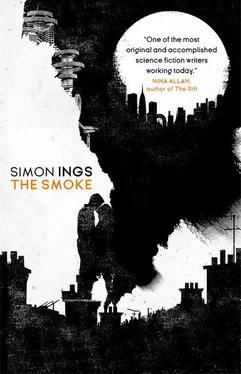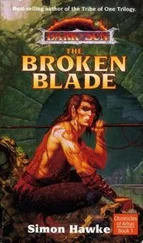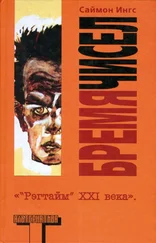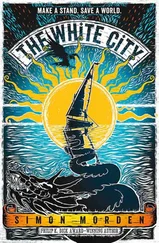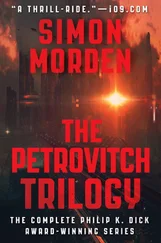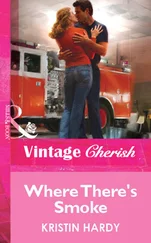‘Why am I meeting Mum outside? I can’t see how that’s going to be comfortable for her.’
Fel, sprawling across our bed in the Barbican, gestured at her tablet. She twisted and fiddled with the air above the screen: ghosts rose from the glass and spun. But even Fel was bested by Medicine City’s overmediated user portal. ‘I’m not sure “inside” and “outside” mean very much in Medicine City any more.’
I bit my tongue. The baroque complications the Bund larded over everything had long since ceased to captivate me. ‘I just need to know where I’m going.’
In reply, Fel dug about under our pillows and pulled out the glass wafer that was her new phone. ‘Take this.’
‘You know I don’t have a clue how to operate that.’
She tapped it. A miniature colour-coded urban landscape appeared. ‘Ladywell. Follow the blue dot.’ She waved the phone at me to take. ‘It won’t do anything else, I’ve locked it to the app.’
I had no idea what she meant by that. I did know she was trying to be helpful. I knew, too, that without her help I would never have been able to make an appointment in the first place. This, after all, was how the Bund was locking the rest of us out of its accelerated territory: by the sheer weight of its offering. Options, menus, mirrors, proxies – what did these words even mean? What concepts lay behind them? No door was ever barred in the Bund, but no door was ever the right door, either. The Bund was a party at which, unless you knew everyone already, you were never able to strike up a conversation.
‘Thanks,’ I said, pocketing the phone.
She got up and kissed me. I ran my hands over her head. It felt as though I were stroking a cat. Filming had begun on DARE and Fel was sporting a haircut appropriate to submarine commanders: close-cropped, and shaved over the ears. She kissed me again. ‘I hope it goes all right.’
‘“All right”?’
I didn’t mean to be awkward with her. She was only trying to be kind.
She let me go. She was out of patience with me, and trying not to show it. ‘I don’t know what you want. Not really.’
I took a breath. I had no desire to take my confusion out on her.
The least I owed her was an effort to be honest.
‘Your father’s treatments.’
‘Yes.’ She let go of me and climbed back under the sheet.
‘What do you think?’
‘What do I think?’ She paused a second, letting me register the inadequacy of my own question. ‘I think they work.’
‘Yes.’
‘In fact, I know they do.’
I sat beside her on the bed.
‘Maybe,’ she said, ‘you’re asking me the wrong question.’
I took a breath. ‘I can’t ask you how you feel about it,’ I said. ‘It wouldn’t be fair of me. I don’t know what I feel about it myself.’
‘I am the wrong person to ask,’ Fel agreed. ‘I’m too close to it. I grew up with Daddy’s work. It seems normal to me. Inevitable, in a way it doesn’t to anyone else. Not yet. Not even in the Bund. I don’t think it does you and me any favours that your mother’s been invited to go through with this. I know that’s selfish of me.’
I took her hand. ‘I feel the same. I know I shouldn’t but… There’s something else.’
‘Yes?’
‘My father’s coming to town to see her. He’s going to need somewhere to stay.’
It took Fel a moment to realise what I was getting at. ‘I’ll book him a room,’ she said.
‘He wouldn’t feel comfortable with that.’
She lay back on the bed, staring at the ceiling. ‘Right.’
‘It won’t be for long.’
I lay beside her on the bed. Her hand found mine. ‘I’m sorry,’ she said.
‘It’s fine. I didn’t mean to be a bitch.’
‘It’s not that.’
She turned to look at me.
I said: ‘If Bob asked you about the treatments, what would you tell him?’
Fel thought about it. ‘I’d tell him the truth. That Daddy’s a genius. That the Process he’s invented is the future. That death has lost its sting. Beyond that, what other people believe is irrelevant. Don’t you think?’
That Georgy Chernoy’s triumph over death would usher in a new world was evident. But I could not imagine Bob wanting to take up residence in that world. It would surely repulse him. All his life, Bob had lived for the weekend. A long rest by a sunny brook and fish enough to catch. What was Death to him but an everlasting weekend, an eternal release from the labour of living? I could not imagine anyone less likely to consider the Chernoy Process a victory. Seen through Bob’s eyes, in fact, it could only be thought a betrayal.
‘Go.’ Fel kicked me under the sheet. ‘You’ll be late.’
To get there quickly I caught the Tube but it was already four by the time I arrived at London Bridge. This station being a Bundist development, I was not surprised to find the layout changed since my last visit and extra exits added for streets I’d never heard of. The gloss and finish of the place did surprise me, though they offered but the barest hint of the bizarre transformations I would encounter above ground.
The conceit of the designers was that London Bridge owed its existence to bones. And I had read enough at college to know that this was, in a strict historical sense, perfectly true: Southwark has risen from the marshes of the ancient Thames on the bones of its settlers and their animals, accreting layer by layer like a coral.
The same is true of many long-settled places.
Because the Tube line had been dug deep here, the remade station had been fashioned as a slice through history. The walls were lacquered earth, and in the earth were the leavings of past ages of London. Potshards and wooden clogs. A trove of coins. Chicken bones in the ashes of a fire. As I ascended the escalators to street level, so I moved through time, through timbered frames and broken arches, pools of shattered stained glass, swatches of stained brocade. Then ironworks. Pipes and pumps. The homogenous tilth in which the station’s faux-relics had been ‘buried’ (set in lacquer, polished, cunningly lit) vanished entirely, squeezed out by a tangle of ducts, drains and brickwork vessels – the innards of a world coming to mechanical life.
The story these corridors were telling was not subtle. It was coarse, triumphalist and irresistibly exhilarating. As I neared concourse level, iron ceded to plastics and glass and ceramic, and the whole fabric of the building seemed in motion, responding as an anemone might to my passing. The entire subterranean structure was a narrative of human progress, writ according to the Bund’s rigorously materialist creation myth, in which the poor, bare forked folk of the Earth had assembled, out of dirt and heat, generation by generation and oh-so-painfully, a living thing out of dead stuff – a city that first had breathed, then gushed, then felt and cried, and now, at last and with the coming of the Bund, had begun to speak.
I had a moment’s panic while I fished for my ticket, then remembered that Fel’s phone itself would let me through.
I held it up to the plastic barrier, which slid open, letting me onto Tooley Street and a project that, since my last visit, had taken a strange and baffling new direction.
The tram stop was where I expected it to be, and the tram, though wheelless, propelled on a cushion of magnetised air, was in all other respects as I remembered it. The street, however, had quite vanished, broken into pieces and rearranged as if within a giant’s kaleidoscope.
There was no longer any second Saint Paul’s, but fractured pieces of that structure hung about the street as though projected on the air. Look again, and you would see that these shattered baulks were solid enough, artfully suspended by wires thin as silk from distant sky-grey gantries. Some of the rubble was shrunken to the size of a bin or a bench, while other fragments had been blown out of proportion, so that the statue of Queen Anne, for example, which, like its original, had stood at the foot of the cathedral steps, now spanned the entire thoroughfare, with a tunnel for traffic drilled through her skirts. The whole effort here seemed directed against the comprehending eye, destabilising and dethroning it, making every angle as legitimate as every other, as though the whole view were a canvas by Picasso, that avant-garde Parisian artist whose career had been cut so cruelly short by the wartime gassing of that city.
Читать дальше
